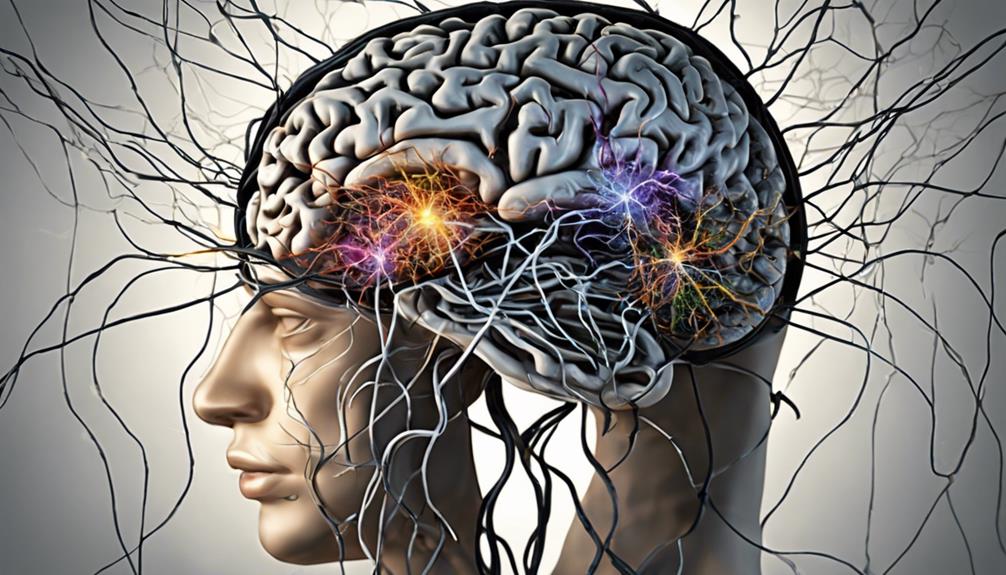As we navigate the landscape of narcissistic abuse recovery, we find ourselves peeling back the layers of a complex emotional labyrinth. The intricate web of manipulation and trauma woven by narcissists leaves lasting scars on the psyche, challenging our very core beliefs and sense of self.
But what lies beyond the shadows cast by this dark past? By exploring the factors that influence recovery, the brain changes resulting from such abuse, and the profound impact it can have, we begin to unravel the mysteries of healing and resilience in the face of adversity.
Key Takeaways
- Recovery duration varies based on relationship length and support system.
- Emotional abuse can alter brain function, impacting memory and fight-or-flight responses.
- Narcissists use tactics like gaslighting and threats, causing confusion and insecurity.
- Healing from narcissistic abuse requires addressing brain changes, trauma effects, and support systems.
Factors Influencing Narcissistic Abuse Recovery
In understanding the dynamics of narcissistic abuse recovery, the duration and effectiveness of healing are significantly influenced by various factors such as the severity of the abuse, the presence of a supportive network, and the individual's mental health condition.
The extent of the trauma endured plays a crucial role in determining the path to healing. A strong support system, comprising understanding friends, family, or therapists, can provide a safe space for processing emotions and experiences. Additionally, one's mental health condition before and after the abuse affects how they navigate the recovery journey.
It's essential to acknowledge these factors as we embark on the road to healing from narcissistic abuse, ensuring that we address these influences with compassion and understanding.
Brain Changes From Narcissistic Abuse

Emotional trauma resulting from narcissistic abuse can lead to significant changes in brain function, impacting memory, emotional responses, and overall well-being. These alterations can have long-lasting effects on how we perceive and interact with the world around us.
- Altered Memory: Memories may become fragmented or difficult to recall accurately.
- Emotional Dysregulation: Heightened emotional responses or difficulty in regulating emotions.
- Cognitive Impairment: Trouble concentrating, making decisions, or processing information effectively.
Understanding these brain changes is crucial in the recovery process, as it allows us to address the root causes of our struggles and implement targeted healing strategies. By acknowledging the impact on our brains, we can take proactive steps towards restoring our mental well-being and reclaiming our sense of self.
Impact of Narcissistic Abuse Severity
The severity of narcissistic abuse plays a critical role in determining the lasting impact on survivors' mental and emotional well-being. When abuse is severe, the scars run deep, affecting self-esteem, trust, and overall psychological health.
Survivors of extreme forms of narcissistic abuse, such as constant gaslighting, threats, or sabotage, often experience profound emotional wounds that can be challenging to heal. The intense manipulation and psychological warfare waged by narcissists can leave individuals feeling shattered and questioning their reality.
These severe forms of abuse can lead to long-lasting trauma, making it crucial for survivors to seek support and professional help in order to navigate the healing process effectively. Understanding the gravity of the abuse endured is a vital step towards reclaiming one's sense of self and well-being.
Childhood Trauma Effects on Recovery

Survivors of extreme forms of narcissistic abuse, particularly those stemming from childhood trauma, often face significant challenges in their recovery journey due to the deep-rooted impact of early emotional wounds. Childhood trauma effects on recovery are profound:
- Trust issues may hinder forming healthy relationships.
- Self-worth struggles can lead to difficulties in setting boundaries.
- Emotional triggers from past trauma may impede progress in therapy.
Navigating these effects requires patience, self-compassion, and professional guidance. Recognizing the lasting impact of childhood trauma is crucial in understanding the complexities of healing from narcissistic abuse.
Healing Strategies Post Narcissistic Abuse
After enduring narcissistic abuse, implementing consistent self-care practices is vital for fostering healing and reclaiming personal empowerment. Engaging in activities that promote self-love and self-compassion can help rebuild a sense of identity and worth that may have been shattered by the abuse. Here is a table outlining effective healing strategies post-narcissistic abuse:
| Healing Strategies | Description |
|---|---|
| Therapy and Counseling | Professional guidance can aid in processing trauma and developing coping mechanisms. |
| Mindfulness and Meditation | Practices that focus on the present moment can help manage anxiety and stress. |
| Establishing Boundaries | Setting clear boundaries with toxic individuals is crucial for emotional well-being. |
| Creative Expression | Art, writing, or music can be therapeutic outlets for processing emotions silently. |
These strategies, when combined, can facilitate a journey towards healing and rebuilding a fulfilling life post-narcissistic abuse.
Support Systems for Narcissistic Abuse Recovery

In navigating the journey of recovery from narcissistic abuse, establishing a strong support system is paramount for fostering healing and growth. It's crucial to lean on those who understand your experience and can provide empathy and guidance.
Here are three key components of an effective support system:
- Therapeutic Guidance: Seeking professional help from therapists trained in trauma and narcissistic abuse can offer valuable insights and tools for healing.
- Community Connection: Connecting with others who've gone through similar experiences can provide a sense of solidarity and validation, reducing feelings of isolation.
- Boundaries and Advocacy: Surrounding yourself with individuals who respect your boundaries and support your healing journey is essential for maintaining a safe and nurturing environment.
Frequently Asked Questions
How Can the Presence of Narcissistic Abuse in Childhood Impact Adult Relationships and Self-Esteem?
Experiencing narcissistic abuse in childhood can deeply affect adult relationships and self-esteem. The lasting impact may manifest as trust issues, low self-worth, and difficulties establishing healthy boundaries. Healing together through support and therapy empowers growth.
Can Engaging in Mindfulness Practices Help in Healing From the Brain Changes Caused by Narcissistic Abuse?
Engaging in mindfulness practices can aid in healing from brain changes due to narcissistic abuse. By cultivating awareness and acceptance of our experiences, we can navigate trauma's impact on our minds, fostering resilience and growth.
What Role Does Self-Compassion Play in the Recovery Process From Narcissistic Abuse?
Self-compassion is crucial in our recovery from narcissistic abuse. It fosters self-kindness and understanding, counteracting the negative self-talk instilled by abusers. By treating ourselves with compassion, we pave the way for healing and reclaiming our self-worth.
Are There Specific Techniques or Therapies That Are Particularly Effective in Addressing the Emotional Trauma of Narcissistic Abuse?
We've found that various therapeutic techniques, such as cognitive behavioral therapy and EMDR, can effectively address emotional trauma from narcissistic abuse. These methods focus on processing past experiences and enhancing coping skills for healing.
How Can Societal Attitudes Towards Narcissistic Abuse Survivors Influence Their Healing Journey?
Societal attitudes towards narcissistic abuse survivors significantly impact our healing journey. Validation, understanding, and support foster recovery. Empathy from others aids in rebuilding self-worth. Positive societal views create a safe space for healing and empower survivors in their journey towards wholeness.
Conclusion
As we navigate the tumultuous waters of narcissistic abuse recovery, we must remember that healing is a journey, not a destination.
Like a phoenix rising from the ashes, survivors have the strength to reclaim their sense of self-worth and rebuild their lives.
Through understanding, support, and resilience, we can emerge from the shadows of trauma and step into the light of empowerment.
Together, we can rewrite our stories and create a future filled with hope and healing.









